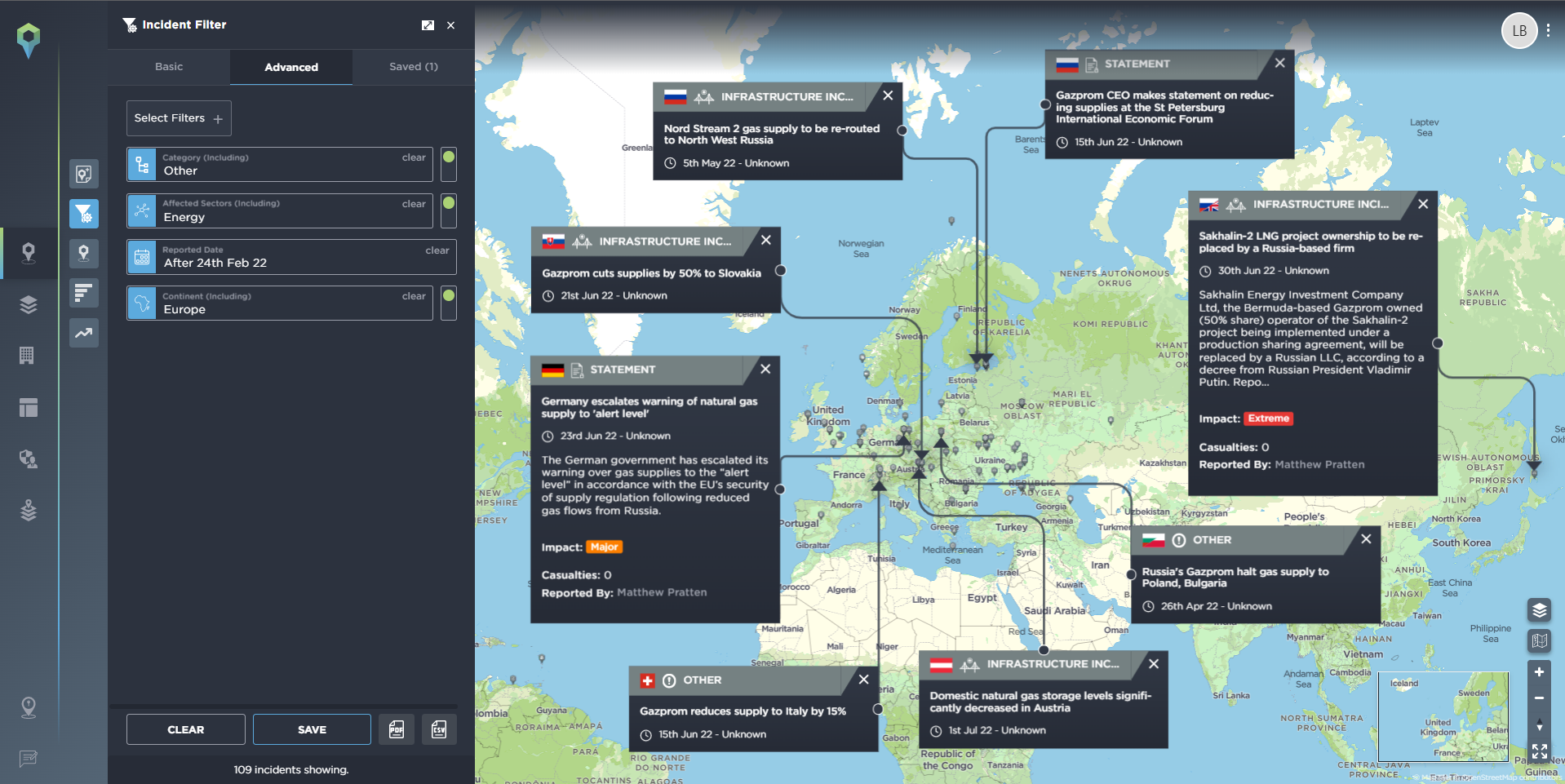Scotland’s IndyRef2 and the growing independence movement in Wales
Following the Supreme Court decision on the campaign for IndyRef2, we take a closer look at the groups pushing for another Scottish referendum, and how the independence movement is gaining momentum across Wales too. We've put together a brief guide on the political parties and grassroots movements calling for the two countries to break away from the United Kingdom.
On 23rd November 2022, the UK Supreme Court ruled on the legality of a touted second Scottish Independence referendum. Eight years on from the first Scottish Independence referendum, the state of the United Kingdom has changed significantly. With Brexit, COVID-19 and a cost of living crisis, many are reconsidering the make-up of the union they find themselves in.
Feeling neglected and unrepresented by those in Westminster, many throughout Scotland and Wales find themselves turning towards independence movements as an alternative. Who exactly are these independence movements and what do they stand for?
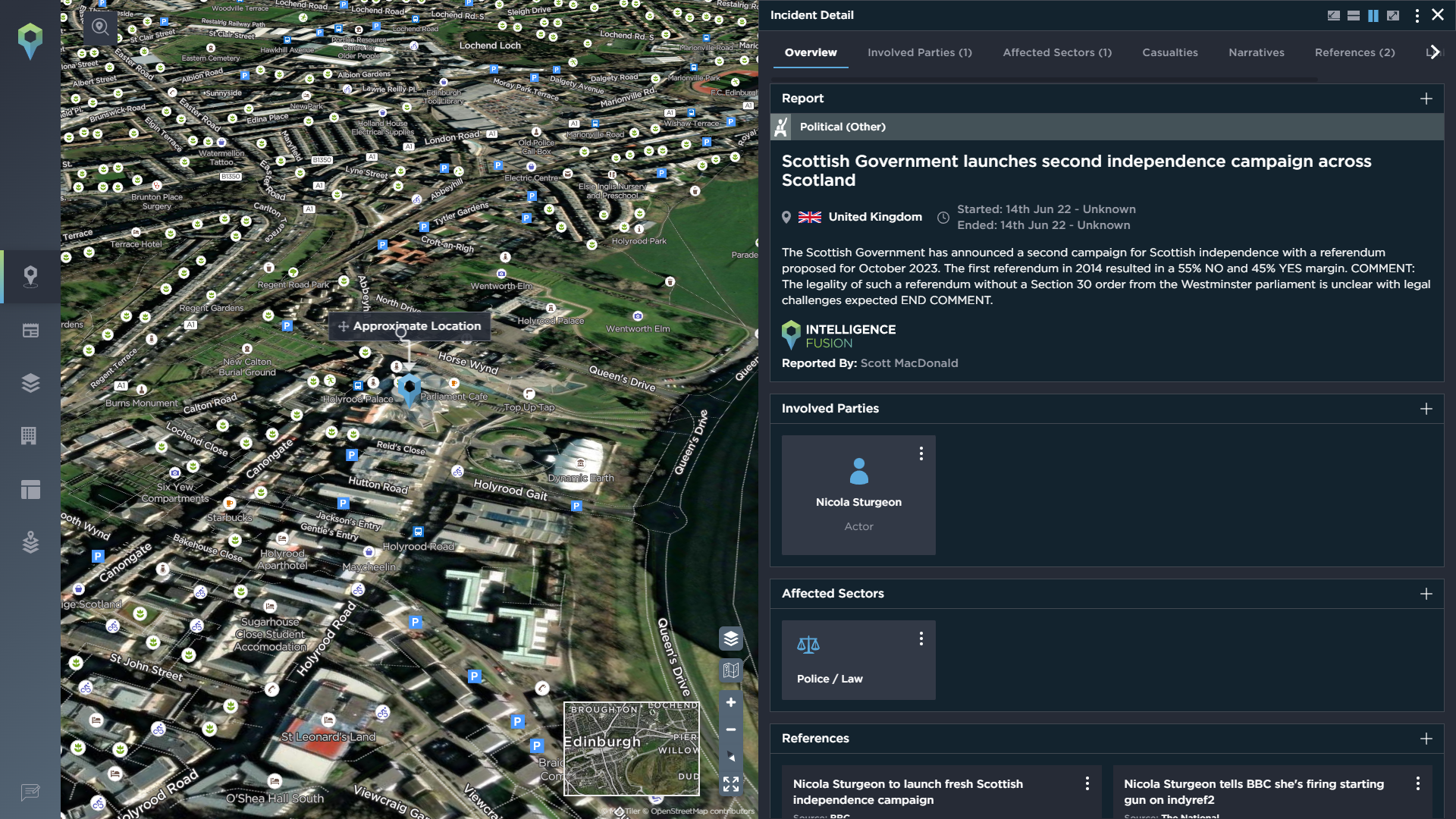
The Scottish Government launched a second independence campaign in June 2022 [Image source: Intelligence Fusion]
What is the Scottish Independence Movement?
Of the two independence movements in mainland UK, the Scottish Independence movement is the more high profile, with years of campaigning leading to the First Scottish Independence Referendum in 2014. Despite the result of this ‘once in a generation’ referendum resulting in a defeat for independence, a number of factors – most notably the UK’s withdrawal from the European Union as a result of the 2016 Brexit referendum – led to Scottish First Minister Nicola Sturgeon formally launching a second independence campaign on 14th June 2022; crucially, without the consent of the UK government in Westminster.
Will there be another Scottish Referendum?
Following resistance from Westminster, Nicola Sturgeon declared that a second independence referendum, referred to as IndyRef2, would be held in 2023 with or without the permission of Westminster. The SNP have been proposing their plans and steps towards achieving independence, treating the proposed referendum as consultative rather than executing. Key points of their plan include re-joining the EU, its own Scottish Pound (although the pound sterling would be used until the creation of one), and control over its own economy and energy.
With the Prime Minister at the time, Boris Johnson refusing the transfer of power, the Supreme Court sat to rule on the 23rd November 2022 if the Second Referendum was constitutionally sound and would be held. Coming to a unanimous judgement, the Supreme Court ruled that, because the Scotland Act gives the Scottish Parliament ‘limited powers’, and because matters relating to the union between Scotland and England are reserved to the UK parliament, the Scottish Parliament does not have the power to legislate for an independence referendum. Therefore, the Scottish government could not hold an independence referendum without consent from the UK government – which is not likely to be granted.
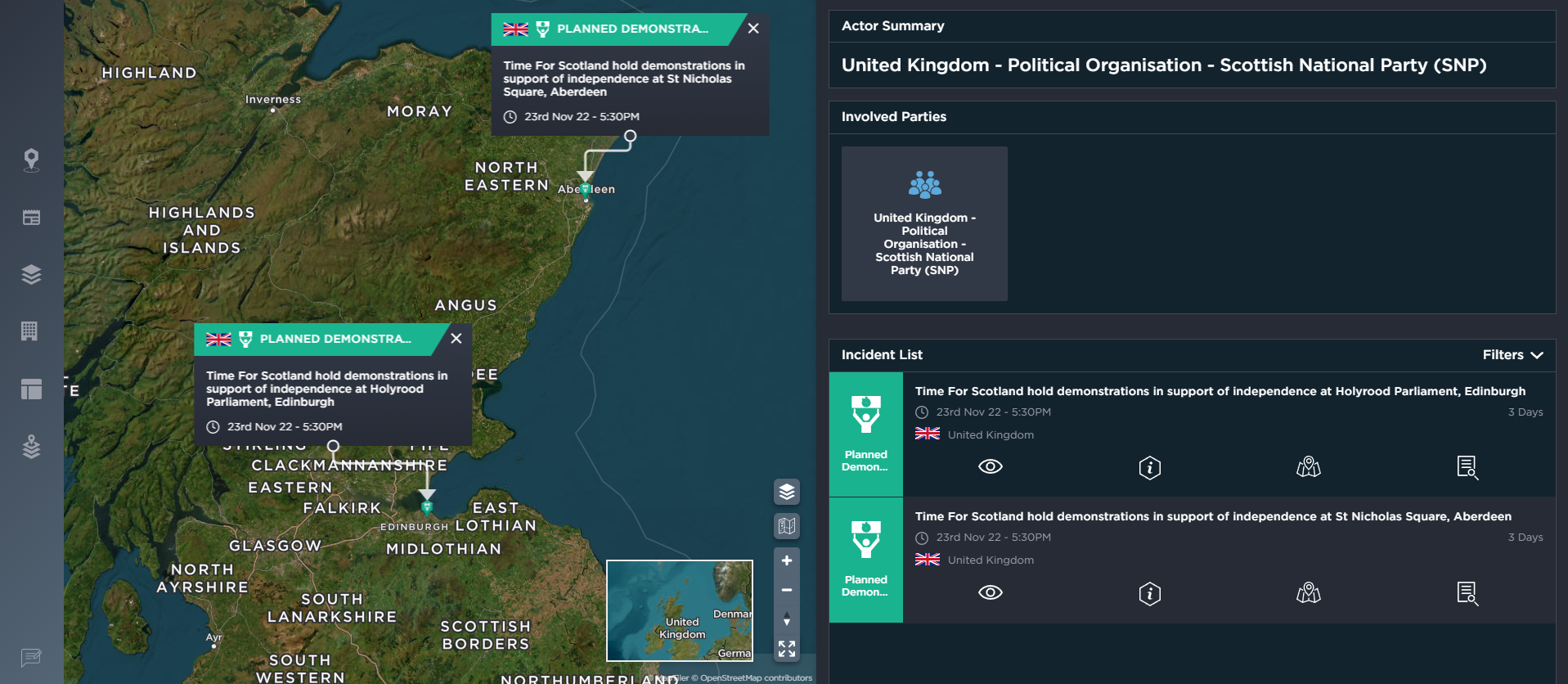
The Scottish National Party (SNP) are the largest drivers of the Scottish Independence Movement [Image source: Intelligence Fusion]
What are the political parties in Scotland?
Scottish National Party
The Scottish National Party, also known as the SNP, are a nationalist political party, and the largest single party in Scottish Parliament, currently in a coalition with the Scottish Greens. The SNP are the only party in Scottish Parliament to have held a majority; this is particularly impressive considering that the Scottish parliament uses the Single Transferable Vote system which makes it difficult for a single party to hold a majority and is a testament to their popularity. They also hold 45 out of 59 Scottish seats in the House of Commons. The SNP primarily advocate for Scottish independence and membership into the European Union.
Currently led by Nicola Sturgeon, the party was previously led by Alex Salmond before he resigned following the 2014 Independence Referendum. The party holds a significant number of seats in the House of Commons, and combined with the Scottish Greens, the majority of seats in Scottish Parliament are pro-independence.
The SNP campaigned heavily for independence and was granted a referendum in 2014. The party tried to convince the Scottish public to vote for independence in the referendum but ultimately the result was for Scotland to remain in the United Kingdom at 55.3%. When submitting the white paper, it was determined that an independence referendum would be a once in a generational vote unless a major change were to happen such as the United Kingdom leaving the European Union. With the result of Brexit and Scotland voting overwhelmingly to remain in the EU, at odds with the majority of the UK, The SNP once again pushed for an independence referendum, with Nicola Sturgeon stating that “It was clear the people of Scotland see their future as part of the European Union” and that it was “democratically unacceptable” that Scotland should be taken out of the European Union.
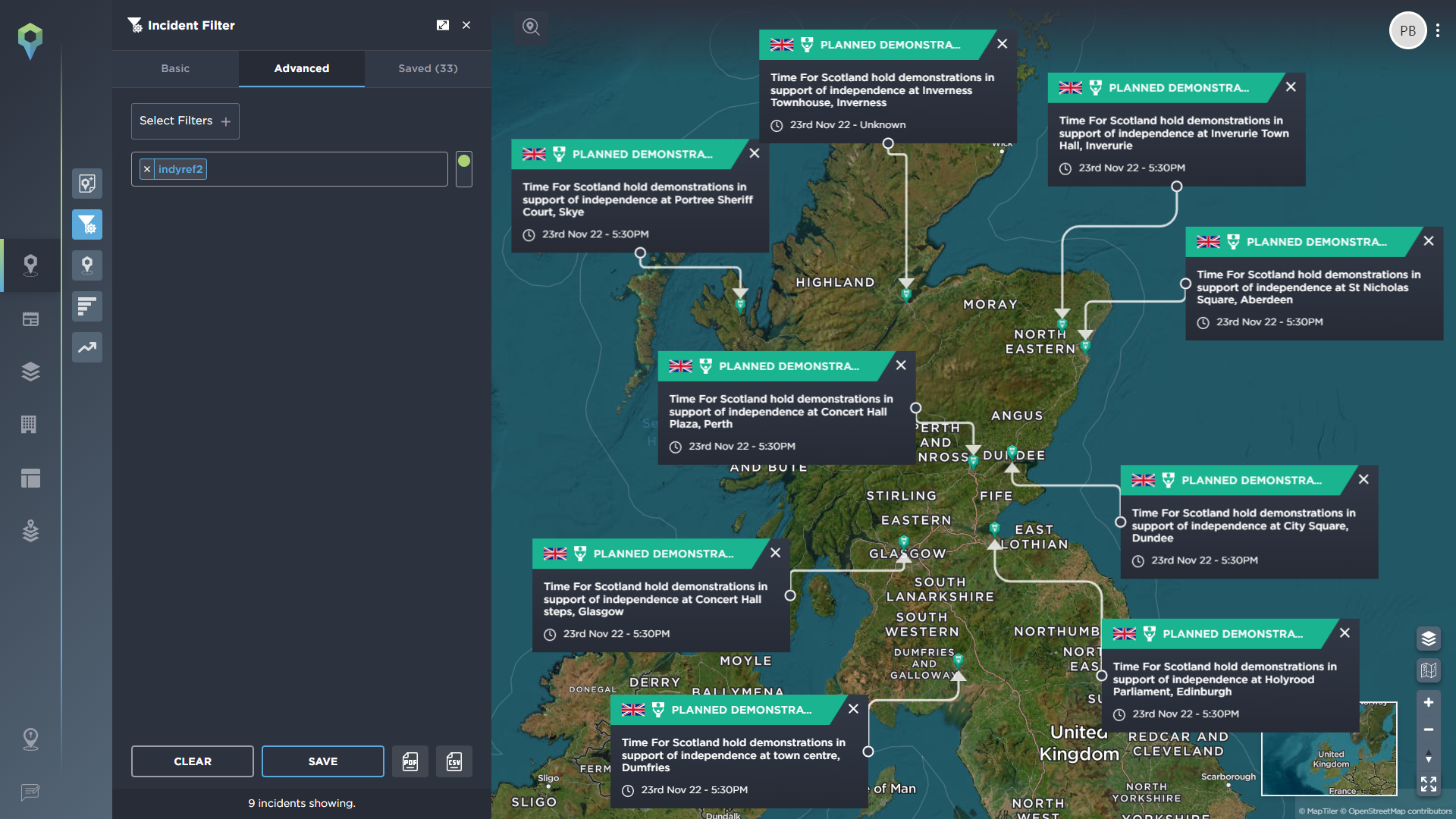
A Supreme Court ruling on the constitutionality of a second Scottish Independence referendum arrived on 23rd November 2022. Pro-independence demonstrations have been planned to coincide with the ruling. [Image source: Intelligence Fusion]
Scottish Greens
The Scottish Greens are a pro-independence, green party who are in a coalition with the SNP. Although a small party, membership has increased drastically following the 2014 Scottish Independence referendum. The party advocates for independence strongly, not only for the same reasons as SNP but also to oppose nuclear power and particularly the Trident nuclear program.
The Scottish Greens have stated full support for the second Scottish Referendum and that, should the Supreme Court prevent this referendum, they will treat the next general election as a referendum on independence. It is unclear what the Greens mean by this, however it could be to use the percentage of votes won by pro-independence parties as a consultative metric.
Alba
Alba is another pro-independence nationalist party led by ex-leader of the SNP, Alex Salmond. The party formed in 2021 and is significantly smaller than the SNP. Salmond leads the party following being removed from the SNP after accusations of sexual misconduct of which he was acquitted. The leader often criticises Sturgeon, accusing her ‘inner circle’ of plotting against him. Some members of the SNP have defected to back Salmond and Alba preferring his method and plans of delivering independence.
Alba often vote alongside the SNP on many policies, particularly those on further devolution and the path towards independence, while the party, following the death of Queen Elizabeth II, has pushed for Scotland to become a republic.
Is there a Welsh Independence Movement?
While less high profile than the movement for Scottish Independence, there is nevertheless a growing Welsh Independence movement with large, more frequent protests beginning to be reported.
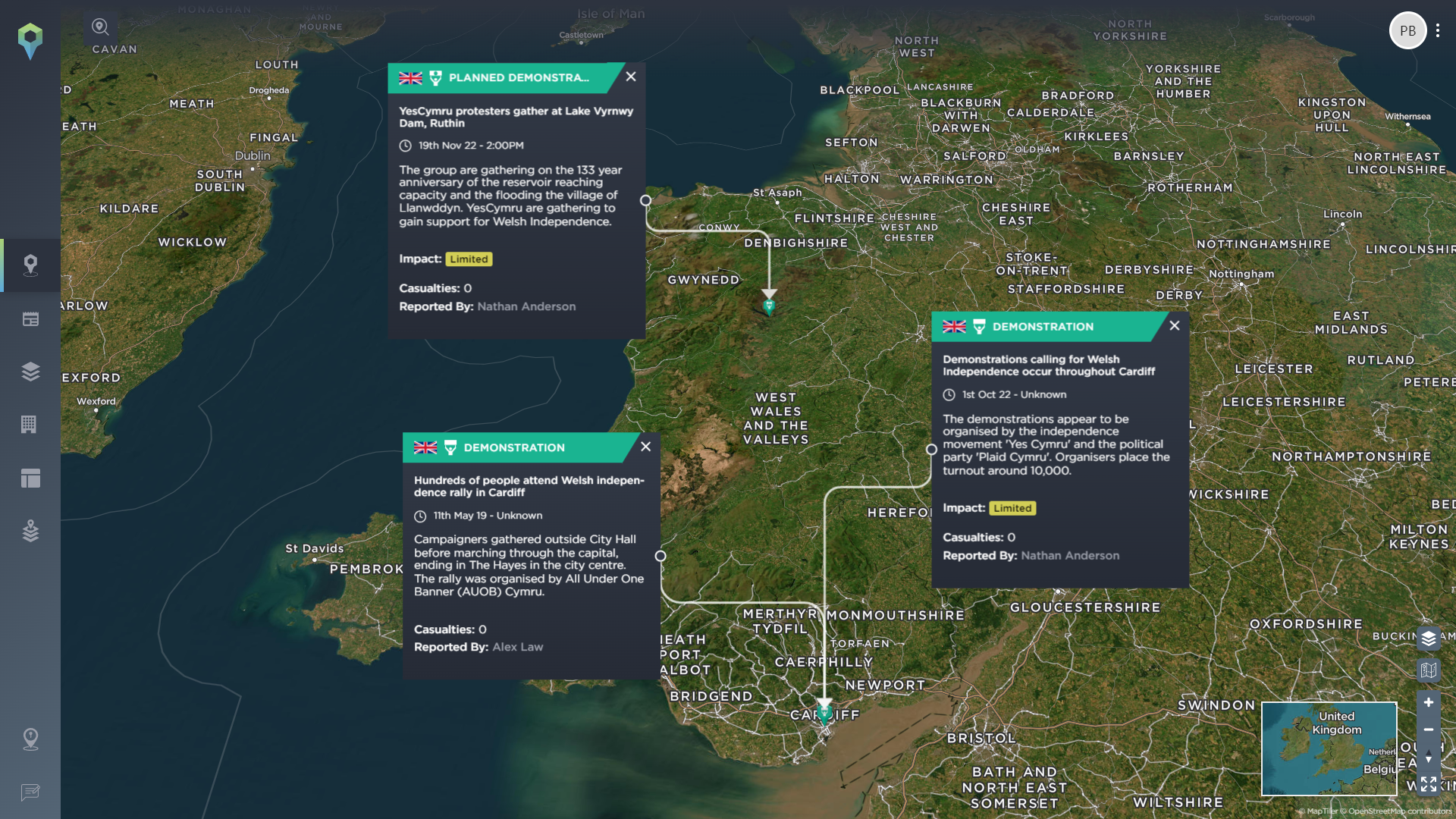
Pro-independence demonstrations are becoming increasingly frequent in Wales. [Image source: Intelligence Fusion]
What are the political parties in Wales?
Plaid Cymru
Plaid Cymru are often seen as the Welsh-equivalent of the Scottish National Party from an independence perspective. Commonly referred to as Plaid, the party is the largest party in Wales outwardly supporting independence from Westminster. The centre-left party started in the 1920s after no party existed to advocate for the establishment of a Welsh Government, the party has increased supporters over the years with few declines, having and maintaining an all-time best result of four seats in the House of Commons. The party has entered coalitions with Welsh Labour in the Senedd in the past.
Plaid’s main policies consist of self-government for Wales, safeguarding the traditions, language and economic position of Wales and to secure membership of a self-governing Wales in the United Nations.
Welsh Labour
Welsh Labour have been the ruling party in Wales since its devolution in 1999 and, winning seats since 1922, the party boasts a large and historical support base in the country. The party however has never explicitly stated its support for Welsh Independence. First Minister and leader of Welsh Labour Mark Drakeford has referred to himself as ‘Welsh first and British next’ but has maintained a narrative of pushing for further devolution from Westminster opposed to a clean break from the Union. The drive towards further devolution from Welsh Labour has increased significantly in previous years.
This is mostly seen through maintaining a distance from and vilifying the current Conservative government and their perceived attempts to ‘meddle’ in Welsh affairs. Recently this has been seen through Westminster repealing the Trade Union (Wales) Act 2017, with many in the party and the Senedd calling it a gross overstep of power. There is growing support in the party for independence to become a larger policy, particularly from the youth base of the party, evident by the formation of groups such as ‘Labour for an Independent Wales’. There have been Welsh Labour candidates who have run on a pro-independence ballot although none were successfully elected.
YesCymru
YesCymru are a non-party political movement dedicated towards the path of an independent Wales. The primary idea behind the movement is that they believe Wales should be governed by those who the Welsh elect and understand Welsh culture. YesCymru and its supporters believe that Westminster does not fulfil those requirements. Although formed in 2014, inspired by the Scottish Referendum, the launch of the group came in 2016. Though not a political party, they often align themselves with the likes of Plaid Cymru and Welsh Labour opposed to that of the Welsh Conservatives, feeling they better reflect similar views of the organisation.
The group have also worked with All Under One Banner Cymru in hosting demonstrations throughout the country to boost popularity and attention to Welsh Independence. This was most recently seen in the first major demonstration since the boom of membership during the COVID-19 pandemic in Cardiff where 10,000 attendees joined YesCymru, All Under One Banner, and Plaid Cymru in a march through the city to promote independence.
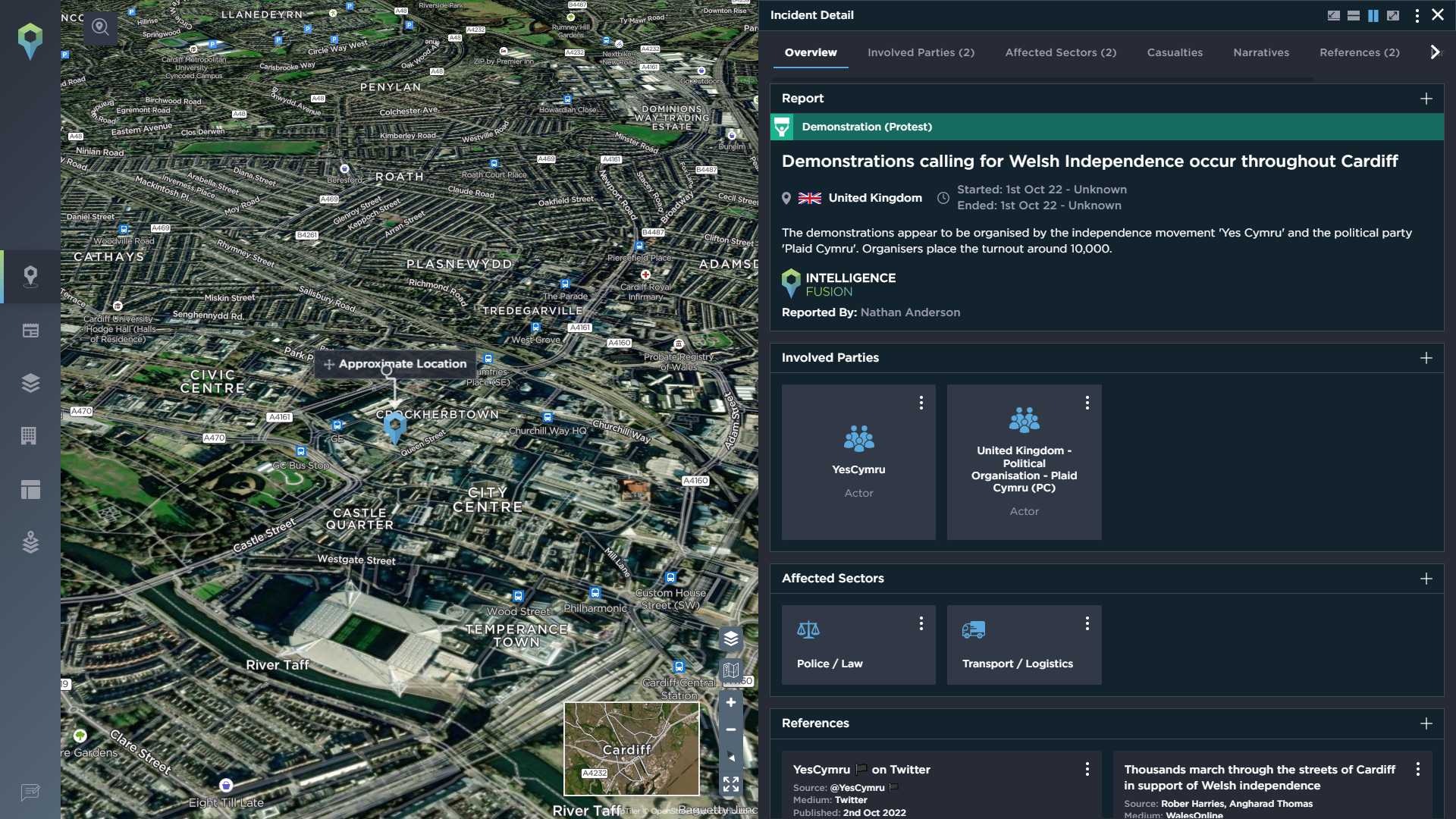
10,000 people marched through Cardiff in support of Welsh Independence in October 2022. [Image source: Intelligence Fusion]
It wouldn’t be unfair to credit a large rise of notice towards Welsh Independence with YesCymru due to their persistent drive to push the message, which was even prevalent throughout the COVID-19 pandemic where they hosted their Yestival, an online festival where they promoted ideas and speakers around independence online throughout 2021. By having smaller groups per region and allocating funding, it created a grassroot movement to recruit new members and spread awareness to the topic. This is evident by its membership in 2020, before the COVID-19 pandemic being around 2,000. This number increased to 8,000 by October and 15,000 by November of the same year. The number of members since has decreased to around 10,000 but a portion of this can be attributed to recent controversies surrounding the ex-chair and not towards independence itself.
YesCymru frequently attempt to increase national fervour, through infographics, leaflets and speeches, about perceived disparities between how Wales is treated compared to England, particularly the south in terms of funding, infrastructure, and representation. They have also increased attention brought to history throughout the country in an attempt to stir more nationalist feelings such as that of “Cofiwch Dryweryn” where a reservoir was built in order to provide water to Liverpool and Wirral at the cost of flooding the village of Capel Celyn in 1957. In bringing attention to incidents such as this it promotes the idea of Westminster prioritising England over Wales, and the idea that England is stealing Wales of all of its natural resources.
Whether it’s independence movements in Scotland and Wales, political turmoil in Northern Ireland, or cost of living or environmental demonstrations, protests have the potential to cause significant disruption to your business and your operations.
At Intelligence Fusion, we help transform the risk management practices of organisations by providing them unrivalled situational awareness via our threat intelligence platform. We track, among other things, the causes of protests, mapping planned demonstrations and strikes ahead of time, and the impact of protests and riots after they’ve happened – all accurately geolocated.
To learn more, and find out how we can help you and your organisation, get in contact with a member of the team now.

